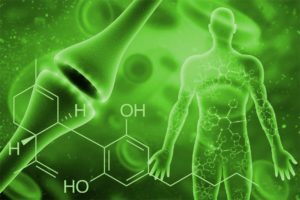A Deeper Dive Into CBD: Our Endocannabinoid System

You’ve seen it in the news. You may even have seen it for sale at your grocery store.
But what is CBD? And why take it?

Cannabidiol, or CBD, is the new cannabinoid in town, and is making a name for itself as a natural way to treat pain and inflammation. But what are cannabinoids and how do they work? And can CBD do more than just help with pain and inflammation? Cannabinoids are chemical compounds found in cannabis and hemp. You’re probably most familiar with THC and its euphoric “high,” but there are over a hundred different known cannabinoids, including CBD, CBN, THCV, and CBG, to name a few.
And guess what? You have cannabinoids inside of you, too, but we call them endocannabinoids (endo means “within”). When we medicate with cannabinoids, whether they are inhaled, ingested, or applied topically, they work by mimicking our body’s endocannabinoids and “talk” to our endocannabinoid system.
The Endocannabinoid System (ECS) is a self-regulating system responsible for monitoring sleep, appetite, pain, and immune system response. Everything that has a nervous system also has an ECS to help maintain health and internal balance. We are learning more every day how much CBD helps maintain this balance and “talks” to our ECS by modifying its receptors and enhancing our natural levels of endocannabinoids.
Now that hemp CBD is federally legal, we can start taking better care of our bodies and our ECS. There are many reasons to take CBD, besides helping our ECS. One great use for CBD is that it provides non-euphoric pain relief and reduces inflammation without the nasty side-effects that often come with prescriptions. Another recent discovery is that CBD’s calming effects could help reduce stress and lower anxiety and depression, although further research is needed. CBD can also help insomnia patients, as recently recommended by The American Sleep Association. Some studies go so far as to say that CBD can act as a daily supplement to our deficient, modern-day diets because extracted hemp oil contains vitamins A, C, E, and B complex vitamins (riboflavin, thiamine, and niacin) as well as all 20 amino acids.
A couple of great ways for people to medicate that are looking for relief, but who don’t like to smoke, are topicals and edibles. Topicals come in packages of 50mg to 500mg depending on the strength. Effects can be felt within moments of application and when applied with a professional massage, can last typically about 3-4 hours. The standard industry serving size for edibles is 5mg or 10mg and can last six to eight hours, but may take 30-60 minutes to take effect. Keep in mind, what works for one person may not have any effect on another. Everyone’s ECS is different so results will vary.
CBD is a great way to help manage insomnia, anxiety, stress, and chronic pain, and it is also a great way to support your ECS and supplement your modern-day diet. At The Still Point we have a number of CBD products for use in treatments or at home all brands we sell have been carefully selected for purity and efficacy.
The World Health Organization has published a report stating, “In humans CBD exhibits no effects indicative of any abuse or dependence potential…. To date, there is no evidence of public health related problems associated with the use of pure CBD.” With that said, CBD is also known to interact with several medications. If you are on medication, consult your doctor before you start using CBD oil to ensure your safety and avoid potentially harmful interactions. Nothing in this article is meant to provide or substitute medical advice.
By Marisa Escudero of Lucy’s Lozenge
